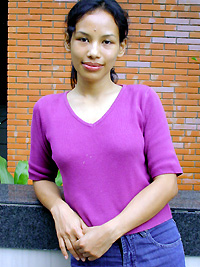| byPeter Janssen and Juliana Wilson |
At the dimly lit Sudirman International Cafe, the literati have gathered to drink beer, smoke cigarettes and listen to a young woman talk about sex. The scene wouldn’t be notable in most cities, but this is Jakarta, capital of the world’s most populous Muslim country. Ayu Utami, 35, a slender Javanese beauty with sharp features and an open smile, is launching her newest book, a collection of essays entitled “Sex, Sketches and Stories.” Sporting a skintight top, Utami deftly fields questions on such topics as marriage, infidelity and sexual liberation. “People think of free sex as something done by people who aren’t married, but actually free sex is something done by married people,” says Utami to shouts of approval. “I love you!” yells one young woman, hoisting a beer. Since the downfall of the autocratic President Suharto five years ago, Indonesia has undergone plenty of upheaval: three presidents, innumerable riots and demonstrations, bloody sectarian clashes between Muslims and Christians. Far less noticed has been the rise of provocative Indonesian literature, thanks largely to a group of bright, bold, attractive, media-savvy young women who are willing to take on the subject of sex. Their growing body of work has been lumped under the label sastra wangi —literally, “fragrant literature”—a somewhat derogatory term that has nonetheless stuck and helped the movement catch on. “There is a newfound freedom now,” says Richard Oh, owner of the QB World Book chain. “These writers aren’t afraid to say anything. This is the first new trend in Indonesian literature for ages and ages.” Utami, a former journalist and a Roman Catholic who cites the Bible as an early inspiration, launched the movement with her first novel, “Saman,” two weeks before Suharto’s fall. Set during his oppressive regime, the novel raised eyebrows mainly for touching on both religious and sexual matters: the main character has an affair with a Catholic priest. Drawing skillfully on both Indonesian slang and literary allegory, “Saman” won the prestigious Jakarta Arts Council competition for new novels and quickly went on to sell 55,000 copies—a good run in Indonesia. A succession of women writers quickly followed, each pushing the boundaries of the one who came before. In Dewi Lestari’s wildly popular first novel, “Supernova,” the main characters include a gay couple and a prostitute. Djenar Maesa Ayu published a book of prize-winning short stories, including one entitled “Nursing From Daddy,” in which she expresses a young woman’s rejection of the traditional place of women in society through the metaphor of her suckling her father’s penis instead of her mother’s breast. And Dinar Rahayu, who wears the traditional Muslim hijab scarf in public, wrote about sadomasochism and transsexuality in her first book, “Ode to Leopold von Sacher Masoch.” Soon after it was published, she resigned her position as a chemistry teacher at a progressive, privately run Muslim high school. But like most of her peers, she made it onto Indonesia’s top-10 best-seller lists. Some believe the sastra wangi writers are merely bringing to light the country’s natural lustiness. “We Indonesians are a raunchy lot,” says Julia Suryakusmana, academic, writer, publisher and self-proclaimed feminist. “We’ve got our own traditional culture that is very sexual. It’s just that there is a schizophrenia between historical reality and what is called ‘Eastern’ values.” That schizophrenia reached new heights under Suharto’s long rule, from 1966 to 1998. After allowing an initial period of openness, in the early 1970s Suharto cracked down hard on all forms of critical and creative thinking. “For a period of about 25 years there was a lost generation in terms of Indonesian literature, when writers wrote more and more obliquely,” says John McGlynn, director of publications at the Lontar Foundation, a nonprofit organization that translates Indonesian literature into English. “The refreshing thing—not just about the women writers but the whole generation of new writers—is they are reclaiming their voice.” So far, that voice is in no danger of being silenced. Indonesia’s Muslim leaders, who have been waging strict campaigns against pornography and suggestive dance shows on TV, have left the sastra wangi set alone. That may have less to do with the message than the medium; since most Indonesians don’t read, literature is not deemed as dangerous as other media. “The religious establishment don’t pay attention to art and literature because the impact of literature is limited,” says Nirwan Derwanto, former editor of the respected journal Kalam. “One of the greatest things about the sastra wangi movement is, it is bringing people to literature.” The hordes of women clamoring for Utami to sign copies of “Sex, Sketches and Stories” is clear proof of that. [Editor's Note: From Newsweek International, October 2003, originally titled "Indonesia’s Literary Ladies." Ayu Utami belongs to the Community of Utan Kayu, group of artists and intellectuals animating a gallery and a theatre in Indonesia.] <<< Page X Page X>>> |
| Oct 18, 2002 |
©
2001 Guyanaundersiege.com |
